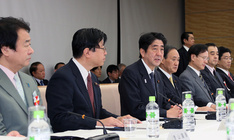 Source: kantei.go.jp
Source: kantei.go.jp Not long after the announcement, Mike Green of the CSIS produced this excellent analysis of Abe’s intentions with his new strategy and what that will mean for Japan’s relationship with its regional partners. In a nutshell, what Green sees is the determination of the Abe government to make Japan more relevant to the region through promotion of Japan as a tier-one power capable of resisting China. This requires the development of relations with nations further away from Japan (which are less problematic than those with China or South Korea) to shore up international backing for Japan’s position vis-à-vis territorial issues and resource availability, while re-affirming Japan’s support for its alliance with the US. Where Green sees a potential flaw in Abe’s plan is his commitment to economic reform, for without the ‘third arrow’ of Abenomics, Japan’s economic future will be less certain and still dominated by concerns about demographics and interest groups.
Green also had this to say about the role of other regional states in helping Japan through its ‘difficulties’ with China… “The United States should embrace Japan’s desire for greater jointness, planning, and readiness. Australia and other allies and partners should move in parallel based on their own national interests and specific arrangements with Tokyo. Japan needs help not only in resisting Chinese coercion, but also in refining its own foreign policy narrative and seeking opportunities for reassurance with Beijing. Friends who stand with Japan on the first objective will have more credibility in influencing the way it pursues the second”. This particular view is one that many in Australia would agree with, given the historical ties between the US, Japan and Australia and the sense of shared values that bind these states together.
China surely recognises this fact, although it may not agree with it. For China to attempt to try to isolate (or worse, punish) Australia for its support of Japan would only breed resentment within Australia towards a country that is viewed with a great deal of scepticism regarding its intentions. Australia has no want nor desire to confront China, yet China’s actions in the South China and East China Sea are destabilising enough to warrant a reconfirmation of existing alliances and partnerships. Japan, as a long standing partner of Australia, is regarded as far more trustworthy, stable and reliable than China, although China’s economic influence in the region may be growing. Despite this, a conservative Australian government, concerned about this influence and the ramifications for regional stability, has embraced its conservative roots and sought assurance in its ties with Japan.
This reality is not, however, to every Australian’s liking. Hugh White, in his long running series of Tuesday op-eds in the Age newspaper, has written that China will inflict punishment on the Abbott government if it continues in its blanket support of Japan and pro-Japanese sentiment. White advocates (briefly) a more neutral stance, in keeping with his criticism of the former Labor government’s stance towards China as being far too pro-US. What White wishes to see is an Australia neither in support of nor critical of China, yet neither too openly in support of either the US or Japan. He claims that this requires a unique level of statesmanship and diplomacy that Australia has never before experienced, and that the absence of such deft diplomacy is jeopardizing Australia’s future and the peace of the region.
White sees in the Abbott government a flawed desire for former alliances and partnerships, claiming that these are harming Australia’s interests rather than strengthening them, and that if Australia does not accept the reality of a greater Chinese power in the region and act accordingly then China will take its revenge to the ruin of Australia and the region. This argument is difficult to accept, not least of which because it presupposes that China is only interested in confrontation, that Chinese diplomacy operates from a level of malevolency equal to the most heinous of dictatorships and that any sign of discord with China’s position will bring about terrible revenge. Would China, with its myriad of social problems and complicated regional relations, find any solace in inflicting long-term damage on its ties with Australia because of the current Australian government’s preference for the assurance of existing, stable relationships? How would that serve China’s interests?
If China truly does practice ‘patience’, as claimed by Henry Kissinger, then seeking confrontation with the current Abbott government over its support for Japan would demonstrate a lack of foresight by China and prove counter-productive to its diplomatic goals. It would be a ‘knee-jerk’ reaction to a perceived slight and move Australia deeper into the trilateral alliance with the US and Japan. Unless China sees Australia as a lost cause and not worth persuading, it would be far better for it to observe Abbott’s ties with Japan and learn from them.
At any rate, this is how the year has ended and a new one is to begin. 2014 promises to be an interesting year in Japan-Australia relations, with bilateral visits by both Abbott and Abe to one another’s countries. Given that Australia hasn’t had a Japanese PM visit since Koizumi, this will be of significance, and coupled with a possible visit from Indian PM Singh will certainly put Australia front and centre in regional diplomatic dialogue. In the meantime, many thanks for reading these posts over the past few months, and I’ll fire up the commentary once I return in early 2014. A Merry Christmas to you and yours, and see you in the New Year.
 RSS Feed
RSS Feed